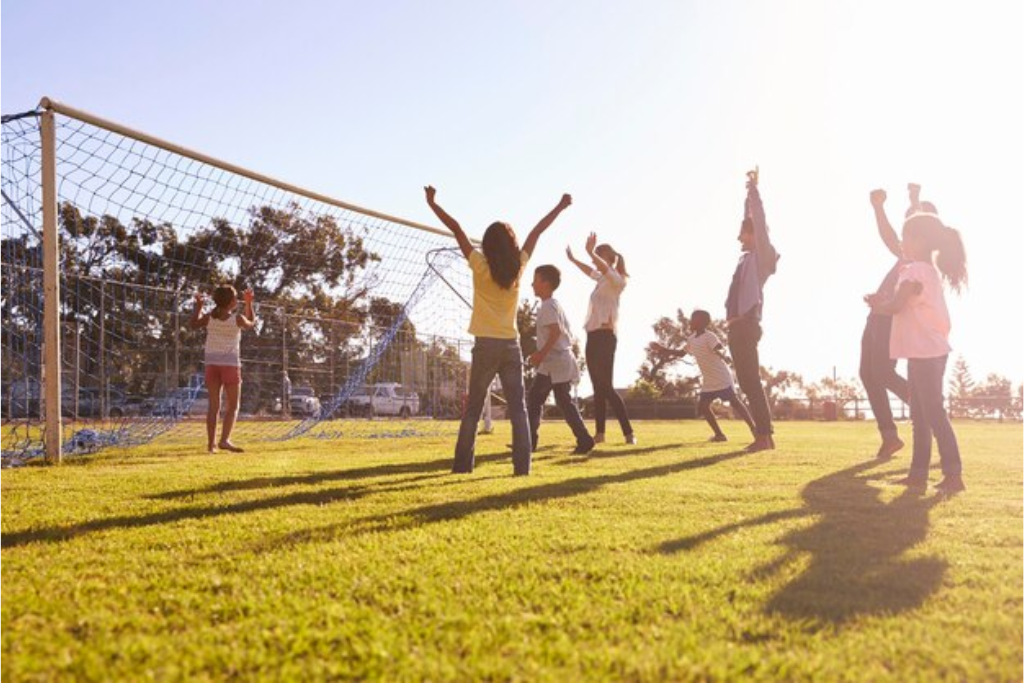The Connection Between Sports and Kids’ Mental Health
Participating in sports is not only about physical fitness; it profoundly influences emotional well-being and overall happiness. Children who engage in sports experience lower levels of stress, improved self-esteem, and stronger social connections. At Youth Rescue Project, we emphasize the role of structured sports programs in fostering holistic development in kids. Sports provide children with opportunities to challenge themselves, develop new skills, and build confidence in a safe and supportive environment. Regular participation can significantly influence a child’s outlook on life, shaping resilience and promoting healthy emotional development that extends beyond the playing field.
Building Emotional Resilience Through Sports
Sports help children cope with challenges, setbacks, and competition, teaching resilience and perseverance. The ability to navigate both victories and defeats is an essential life skill that transfers to academic, social, and personal settings.
- Encourages a positive mindset during wins and losses, teaching children that failure is a natural part of growth.
- Provides safe environments to practice coping strategies for stress, such as focusing on effort instead of results.
- Builds confidence in handling difficult situations both on and off the field, fostering emotional maturity and self-reliance.
Through guided coaching and supportive peer networks, kids learn that challenges are opportunities for learning and growth rather than obstacles.
Enhancing Happiness Through Physical Activity
Regular physical activity stimulates endorphin release, promoting natural happiness and emotional balance. When children engage in sports, they experience a sense of accomplishment, belonging, and joy that is critical for their mental development.
- Improves mood and reduces symptoms of anxiety or depression by encouraging consistent activity and engagement.
- Encourages joyful play and creativity, allowing children to explore movement, teamwork, and strategic thinking.
- Supports consistent daily routines that contribute to mental stability and a sense of structure in everyday life.
Sports serve as a natural outlet for energy, emotions, and stress, providing children with constructive ways to manage their feelings and develop positive coping mechanisms.
How Team Sports Promote Social Skills and Emotional Intelligence
Team sports provide unique opportunities for children to interact, collaborate, and develop essential life skills that extend beyond athletic performance. Participation in team-based activities fosters social awareness, emotional intelligence, and interpersonal competence.
Collaboration and Communication
Kids learn how to communicate effectively and work with others to achieve common goals, an essential skill both on the field and in life.
- Develops listening skills and empathy, helping children understand different perspectives and respond thoughtfully.
- Encourages problem-solving in group settings, as players work together to overcome challenges and strategize effectively.
- Teaches compromise and conflict resolution, emphasizing teamwork over individual success.
These skills are critical for personal development and provide a foundation for healthy relationships in school, family, and community environments.
Leadership and Confidence Building
Being part of a team allows children to take leadership roles and make decisions, boosting self-confidence and independence.
- Provides opportunities to mentor peers or lead drills, cultivating responsibility and accountability.
- Enhances self-assurance in both sports and academic settings by demonstrating competence and initiative.
- Reinforces positive self-identity and independence, empowering children to believe in their abilities.
Structured guidance from coaches at Youth Rescue Project ensures that leadership opportunities are supportive, encouraging children to grow without fear of judgment or failure.
Individual Sports and Personal Growth
While team sports foster collaboration, individual sports emphasize personal responsibility, discipline, and self-motivation. These activities allow children to focus on their personal development, self-reflection, and intrinsic motivation, providing mental and emotional benefits that complement team experiences.
Goal Setting and Achievement
Children learn how to set achievable goals and work consistently to reach them, a skill that translates into academic and personal success.
- Builds focus, motivation, and determination, encouraging children to track progress and celebrate milestones.
- Encourages self-reflection and performance tracking, helping kids understand strengths and areas for improvement.
- Helps children understand personal strengths and areas for improvement, fostering growth-oriented mindsets.
Structured feedback and mentorship enhance the experience, making goal achievement meaningful and confidence-boosting.
Mindfulness and Stress Reduction
Individual sports such as swimming, gymnastics, or martial arts promote mental focus and relaxation. The repetitive and rhythmic nature of these activities encourages mindfulness, helping children remain present and engaged.
- Encourages deep concentration and body awareness, which helps regulate emotions and build inner calm.
- Reduces stress through rhythmic, repetitive activity that creates a meditative effect.
- Helps children feel a sense of control and calmness, improving mental clarity and focus in other areas of life.
Youth Rescue Project integrates mindfulness techniques into sports routines, enhancing the emotional benefits of physical activity.
Physical Benefits That Boost Mental Well-Being
Physical activity directly impacts brain health, improving mood, cognitive functions, and overall mental resilience. When children engage in regular exercise, their bodies and minds develop in harmony, promoting holistic wellness.
Improved Sleep and Energy Levels
Regular sports participation regulates sleep patterns and increases energy, which positively affects mental health.
- Helps children fall asleep faster and enjoy deeper rest, enhancing focus and mood.
- Supports alertness and focus during school and daily activities, improving learning outcomes.
- Reduces irritability and emotional outbursts caused by fatigue, creating a calmer home and school environment.
Consistent activity promotes healthier lifestyles and prevents sedentary habits that can negatively impact mental and emotional health.
Brain Development and Cognitive Function
Physical activity enhances brain function through improved blood flow, oxygenation, and neural development.
- Strengthens memory, problem-solving, and decision-making skills, supporting academic success.
- Encourages creativity and critical thinking through strategic gameplay and active engagement.
- Supports academic performance and concentration, linking physical activity directly to cognitive benefits.
Sports create environments that challenge both the mind and body, fostering well-rounded development in children.
Youth Rescue Project Programs Supporting Mental Health
At Youth Rescue Project, we integrate sports programs specifically designed to enhance emotional well-being while promoting physical fitness.
Structured Team Programs
Team-based initiatives focus on communication, collaboration, and leadership.
- Include mentorship and guidance from trained coaches who understand child development.
- Encourage peer support and positive social interactions to build confidence.
- Build a sense of belonging and community among children, enhancing social competence and emotional stability.
Individual Development Programs
Programs tailored for solo sports emphasize self-growth, resilience, and discipline.
- Include goal-setting exercises and performance reflection to track progress.
- Focus on personal achievement without pressure or comparison, reducing anxiety and building self-esteem.
- Promote mindfulness, focus, and emotional regulation, providing children with tools for mental well-being.
How Parents Can Support Mental Well-Being Through Sports
Parental support is crucial in helping children maximize the mental health benefits of sports. Positive reinforcement, structured routines, and balanced expectations create environments where children thrive.
Encouraging Consistency Without Pressure
- Ensure children participate regularly while respecting their preferences and interests.
- Celebrate effort over outcome to boost self-esteem and resilience.
- Create a supportive environment for trying new sports or challenges without fear of judgment.
Promoting Balance and Rest
- Allow time for rest, hobbies, and family interaction alongside sports to prevent burnout.
- Avoid over-scheduling to reduce stress and maintain mental health.
- Encourage healthy sleep, nutrition, and hydration to support overall well-being.
Positive Reinforcement and Emotional Support
- Offer praise and constructive feedback after practices and games to nurture confidence.
- Discuss feelings about wins, losses, and social interactions to develop emotional awareness.
- Teach children to self-reflect and learn from experiences, fostering long-term resilience.
Long-Term Mental Health Benefits of Youth Sports
Consistent participation in sports can have lasting effects on mental health well into adulthood, shaping emotional resilience and lifelong wellness habits.
Reduced Anxiety and Depression Risks
- Active children are less likely to experience anxiety and depression later in life.
- Skills learned in youth sports, such as resilience and coping strategies, help manage stress effectively.
- Builds a foundation for adaptive social and emotional behavior throughout life.
Lifelong Habits for Physical and Mental Well-Being
- Participation fosters a love for physical activity that encourages healthy lifestyles.
- Encourages ongoing social engagement and teamwork skills, improving community and relationship-building abilities.
- Promotes a balanced lifestyle that supports emotional stability and mental health across all life stages.
Improved Confidence and Happiness
- Children report feeling more self-assured in school, sports, and social settings.
- Positive experiences in sports translate to greater life satisfaction, emotional stability, and happiness.
Enhanced Social Skills and Peer Relationships
- Participants develop lasting friendships and stronger communication skills.
- Mentorship opportunities foster leadership qualities, empathy, and collaboration.
FAQs About Sports and Kids’ Mental Health
What is the recommended frequency of sports for mental health benefits?
Regular participation, ideally multiple times per week, helps maximize emotional and cognitive benefits without causing burnout.
Can all children benefit regardless of skill level?
Yes, the focus is on participation, personal growth, and social interaction rather than performance.
How do team sports differ from individual sports in mental health impact?
Team sports enhance collaboration, empathy, and leadership, while individual sports focus on self-discipline, goal-setting, and mindfulness.
How can parents choose the right sport for their child?
Consider the child’s interests, temperament, and energy level. Encourage trying multiple sports to discover what excites and motivates them.
Final Thoughts: Enhancing Happiness Through Sports with Youth Rescue Project
Engaging children in sports is a proven way to boost happiness, confidence, and mental well-being. At Youth Rescue Project, our programs prioritize emotional growth, social skills, and personal development, ensuring that kids enjoy a balanced, healthy, and joyful experience.
Through structured activities, supportive coaching, and individualized attention, children learn resilience, teamwork, and self-awareness that lasts a lifetime. Investing in youth sports today lays the foundation for lifelong mental health, happiness, and well-rounded development.

